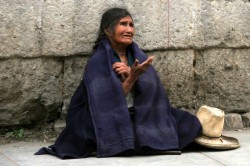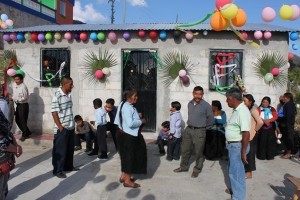Warning: F bomb ahead.
Living in Chiapas has completely cured me of the impulse to “help.”
I live in the mountain highlands of Chiapas in the southernmost state of Mexico. Chiapas is rich in beauty and ecology, but it is one of the poorest places in the world economically. That means I face the reality of poverty and desperation on a daily basis. My own experiences and the things I have witnessed have completely changed me and how I see the world in which we live.
I hope what I have to say will also inoculate you against the plague known as “saving the world.”
I hope you will bear with me as I dole out some stiff truths.
I’m not going to sugar coat anything. I’m going to shoot from the hip and share my unvarnished observations from nearly three years of living in the Third World. However, I do hope you will also stay tuned for the happy ending. I am going to spotlight an amazing organization that is doing world changing things up here in the misty mountains of Southern Mexico.
So, without further ado..
I don’t give a fuck about saving the world because saving the world is a really screwed up, codependent thing to do.
Saving the world is a top down, arrogant, selfish and unhealthy model for making a difference in this world that is usually carried out by people whose unmet and unacknowledged needs for affirmation and control are a huge driving influence in the things they do.
 Saving the world assumes the world needs to be saved and that our way of doing things and thinking about the world, God, education, etc., is the right way. In short, when we set out to save the world, our help comes with all kinds of strings attached to it.
Saving the world assumes the world needs to be saved and that our way of doing things and thinking about the world, God, education, etc., is the right way. In short, when we set out to save the world, our help comes with all kinds of strings attached to it.
But let me back up a minute, and just get down and dirty about poverty and oppression before I lay this whole saving the world thing completely bare.
Have you ever thought about what hungry people will do for food?
Just about any damn thing we ask them to do, that’s what.
If we are lucky, they will do what we ask when we are around and do whatever they please when we are not. I say “lucky” because that means our “help” has found its way into the hands of people whose personal identities are still intact.
In the worst case scenario, the requirements we place on our giving, directly or by implication, will land in the midst of people who have learned so completely to suppress who they are in the face of oppression and exploitation that they can no longer tell their own desires from ours. They have learned to merge with those in power as a matter of survival. These are some of the most traumatized people we will ever meet.
They will worship Jesus with us and never realize they are doing it because we want them to do it.
In most “save the world” scenarios, whether we know it or not, we are just another brand of oppressor to a lot of people.
Saving the world is an oppressive thing to do. It carries with it the history of colonization and exploitation within which it was born. Do good things sometimes come of our efforts? Yes they do, but that is not the point. The point is that the foundation is rotten when we set out to change the world in a top down or evangelical manner.
Saving the world also robs everyone involved of their true humanity.
It makes it almost impossible for those on the receiving end to truly express who they are to us. It robs us of the chance to know them as human beings and to learn from them. Further, it dehumanizes us. We will never be fully seen as people by those we offer to save because we will come to represent resources that must be obtained by compliance and/or manipulation.
To put it bluntly, saving the world does not support people as they move into their thriving. It does not support people to express more fully and completely as who they really are. It bribes them to express more completely as who you want them to be.
Saving the world is also a colossal waste of time, treasure and talent. In all three cases, the source of the waste is the same: people who are out to save the world forget to ask local people what works, what is needed and what can be sustained for the long haul.
Saving the world is about us. It is about feeding our sense of superiority and worth. It may also be about our desire to feel adored by those we are “helping.”
In this regard, let me hit you to another truth about desperate poverty.
 Desperately poor people will be nice to us and dole out the adoration if that is what is required in order to fill their bellies or shelter their bodies.
Desperately poor people will be nice to us and dole out the adoration if that is what is required in order to fill their bellies or shelter their bodies.
When we set out to save the world, we fulfill our dependency needs by directly or indirectly bribing those in economic need to validate our self concept, our belief system or our way of doing things.
Finally, saving the world is exhausting.
When we attempt to save the world, all the responsibility for change falls on us. Like the mythical Atlas depicted holding up the world at the beginning of this article, we carry the weight of the world on our shoulders. This is a load that is too heavy for anyone to bear.
To put it bluntly, saving the world is a self-destructive thing to do. If we persist in it for long, we won’t have anything to offer anyone and our well being and health will certainly suffer.
If you now have a foul taste in your mouth about this saving the world business, I congratulate you.
Welcome to the world of possibilities!
Now, take a swill of Listerine and let’s move forward.
My motivation for writing this article is not to dissuade people from working together to alleviate poverty or better the world. My motivation is to persuade everyone who reads this to consider a whole different approach.
There are people out here in the mountain highlands of Chiapas who are engaged in a whole different kind of venture. They are unleashing human potential by partnering with local communities to create better living conditions for the poorest of the poor.

Recently, I had the pleasure of sitting down to an interview with Paul and Diane Poirier of AFCB, Arthur Fredrick Community Builders.
Every winter Paul and Diane load up their van and drive from Canada to Southern Mexico to spend the money they have raised over the previous year. They build homes for what they call “families in difficult circumstances.” According to Paul and Diane, a secure home is the foundation of a better life because people don’t have to live in fear of being robbed or worse. They also don’t have to worry that adverse weather will tear apart their homes.
What started out as coffee quickly shifted to me feverishly asking them questions and writing down their answers on paper napkins. I was enthralled!
The first thing Paul said to me about their philosophy was so instructive:
“We don’t know too much and we don’t live their lives. They teach us. They become our teachers about their lives.”
Diane later added something truly significant. She said that AFCB immediately backs off after the job is done. Paul and Diane do not check up on the families or monitor their use of the houses. Diane told me that they absolutely do not want to be seen as heroes and they don’t want people to feel like they have to invite them over for coffee.
Paul and Diane are not down here in Chiapas making friends.
Paul and Diane are here changing lives for the better and building up what Paul calls social capital—the kind of trust earned by integrity and consistency that allows AFCB to do even more within the local communities. Paul and Diane are interested in building up this trust so they can expand from building houses to building the economy.
Paul has a dream.
He wants to partner with about 10 or 15 heads of family in the local communities to set up a cooperative business such as a carpenteria, a carpenter’s shop. He says by bringing individual carpenters together in a cooperative, the community can create a healthier economy through increased efficiency while also conserving wood. AFCB would provide state of the art tools and work space.
Paul explained that without social capital, any attempt to bring economic opportunity would likely fail because this kind of a venture would require ongoing support. What he means by support is local managers trained by local people to do things like accounting and dispute resolution.
Paul would expend his social capital to gain local support for a project that could make a huge difference for generations to come.
Paul explained to me that people who have a secure income send their kids on to get a higher level of education—higher than the sixth grade. Education above the sixth grade isn’t really free in Chiapas; there are transportation and material costs. A secure income means families could take the risk of sending their kids to school.
Diane has a dream, too.
She works hard to make sure the women have a voice.
She says the women are not accustomed to making decisions so their preferences can get lost as the men in the community take charge. Diane often takes the women aside to find out what they want.
“I don’t speak Tzotzil, the local Mayan dialect, but I guarantee both the women and I know exactly what we are talking about.”
What I also learned in talking with Paul and Diane is that AFCB is a two way street. Paul and Diane have learned a lot about life from the work they do in Chiapas. I asked each of them what the biggest lessons have been.
Diane said doing this work has changed the way she sees poverty. She said if you can “give people a hand up,” their potential can start to blossom. She added that when people have secure housing, they can connect better with the community and other things start to fall into place. Paul added that people are just people. Poor people want the same things as rich people do: to live dignified lives and to take care of their children.
I think of Paul, Diane and AFCB as ambassadors of dignity.
Inherent in the definition of the word “ambassador” is the idea of respecting sovereignty on both sides of the equation.
Paul and Diane offer a hand up, one person to another without any strings attached. In so doing, they honor the dignity and respect the customs of the communities in which they work. AFCB’s donors provide the resources—subject to Board approval and auditing. Paul and Diane provide oversight on the financial end. Local communities and local community managers decide who is in the most dire need of housing. Labor is supplied by the recipient. Everyone has a stake in what is happening. When the work is done, Paul and Diane go back to Canada and back to raising money for more community projects.
 Last week I had the pleasure of visiting one of the AFCB construction sites. I was also able to meet Juan, the AFCB community manager for a town called Vista Hermosa. AFCB was building a house for his sister in the community where he was born. This was a rare and precious opportunity because Juan, whose native tongue is Tzotzil, speaks fluent Spanish also.
Last week I had the pleasure of visiting one of the AFCB construction sites. I was also able to meet Juan, the AFCB community manager for a town called Vista Hermosa. AFCB was building a house for his sister in the community where he was born. This was a rare and precious opportunity because Juan, whose native tongue is Tzotzil, speaks fluent Spanish also.
I asked Juan to explain to me how AFCB’s work has changed his life and his community.
He didn’t answer my question directly at first. He wanted to tell me his story so I could really understand the long road he has traveled.
Juan shared that when he was a young man, there were no roads between his village and the nearest commercial center. He described walking four hours through the mountains with cargo for sale. As we talked, I got the sense that the beautiful mountain vistas surrounding us had also once served as a trap that deepened the poverty of Juan’s community.
Eventually Juan converted from Catholicism to Evangelical Christianity. As is common, Juan then had to move to a new community because Evangelicals are not permitted to live among the Catholics. Juan wound up in the town of Vista Hermosa. He said he had no corn, no fields, just a house for rent. So, he took the brave and dangerous step of paying a coyote, migrant smuggler, for passage to the United States.
Juan explained that during his years in the U.S., he was exploited. He had no resources, and he suffered. He did learn a little English. This allowed him to come home and land a coveted job in a hotel. He was working in that hotel, in San Cristóbal de las Casas, the town where I live when he met Paul and Diane.
Juan told me that when he saw the work AFCB was doing, it made him very happy.

That first year he knew Paul and Diane, AFCB built five houses for five women. Juan explained that the women had been sleeping in wooden houses with dirt floors. Each house consisted of one room in which there was a fire for cooking. This meant the women were sleeping with the smoke left behind by the fires and also that they were living in constant danger of the fire engulfing their one room homes. To make matters worse, in the rainy season, because the roofs were not water tight, the women often slept in the mud. They were often ill.
In regards to the women, Juan said, “I was very happy to see that they were going to change the houses.” He explained that he was happy to help also and that it makes him “…very happy to see the people with resources and security.” Finally, Juan explained that his life is improving too because now that he works with AFCB, he has a good income every winter. He explained that his whole community is improving.
I asked Juan what he most wants the world to know about the work AFCB is doing. He said that, while it might seem like such a small thing, having a secure home really makes a huge difference to the people affected.
Juan wanted you to know that if you feel called to support AFCB, you will be making really big difference in the lives of people who are suffering a great deal. AFCB estimates that there are 15 more families in Vista Hermosa who need secure housing. They are committed to getting the job done.
I hope you will join them.
If you would like to learn more about their work or make a donation to AFCB, use this link to go directly to their donations page.
You can find Arthur Fredrick Community Builders on Facebook also.
Love elephant and want to go steady?
Sign up for our (curated) daily and weekly newsletters!
Editorial Assistant: Alicia Wozniak / Editor: Renée Picard
Photo: Flickr, elephant journal archives, author provided












Read 3 comments and reply